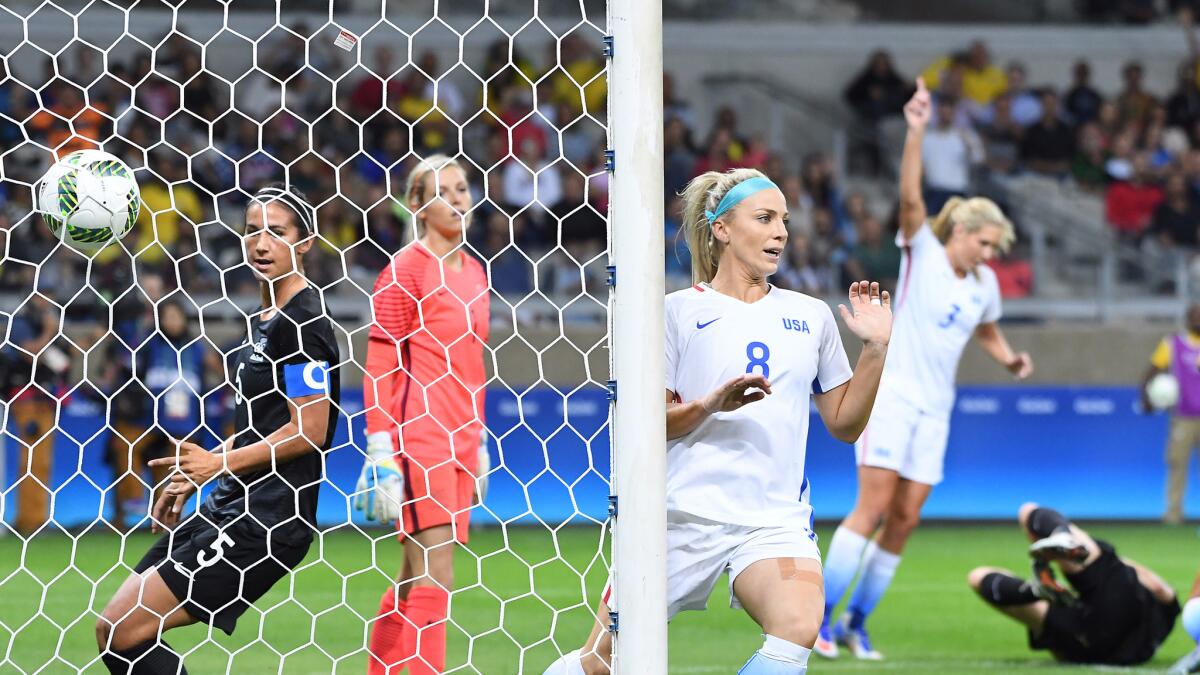Anti-gay chant gets attention of gay U.S. soccer players at Olympics
United States midfielder Megan Rapinoe dribbles against Mexico during a friendly in Carson, Calif., in 2015. Rapinoe, openly gay, called out Brazilian fans for using an anti-gay slur during the U.S. team’s Olympic match with New Zealand: “It is personally hurtful.”
- Share via
Reporting from Belo Horizonte, Brazil — Late in the U.S. team’s opening-game win in the Olympic women’s soccer tournament Wednesday, the tiny crowd of 9,556 inside hulking Estadio Mineirao began entertaining itself.
First it tried the wave. Then it chanted “Zika!” every time famous anti-virus crusader U.S. keeper Hope Solo attempted a goal kick.
Then the crowd crossed the line.
Three U.S. players said Thursday that Brazilians on the sidelines told them fans were also chanting an anti-gay slur often used at men’s club games in Brazil. The Sydney Herald reported the same homophobic taunt was hurled at Australian keeper Lydia Williams and Canadian goalie Stephanie Labbe in Sao Paulo, where Brazilian journalists said it was the first time they knew of the slur being used at a women’s game in their country.
“It is personally hurtful,” offered U.S. midfielder Megan Rapinoe, who said the stretcher crew near the American bench told her what was being shouted. “I think sort of a mob mentality kind of takes over a little bit.”
“I don’t think most of those fans would have said that directly to my face. I don’t think they mean it in that way,” continued Rapinoe who, like U.S. Coach Jill Ellis, is openly gay. “But they need to understand that that’s how it’s taken. They need to understand if all of you are willing to do that, what does that say to a gay player? Especially in the men’s game.
“What does that say to players who are struggling to come out?”
FIFA, soccer’s world governing body, has tried to crack down on homophobic behavior in the stands, recently fining the Mexican federation and threatening further action, including barring fans from World Cup qualifiers played in Mexico.
The federation responded in June by releasing a video in which national team players plead with fans to stop using the slur. But that strategy was undermined days later when Andres Guardado, the team’s vice captain, appeared at a press conference with Coach Juan Carlos Osorio and excused the behavior.
“I seriously don’t think anyone means any harm or” offense, he said before repeating the anti-gay slur into the microphone. “I don’t think it is offensive.”
So the practice has spread. This spring FIFA fined Argentina, Chile, Honduras, Peru and Uruguay over anti-gay chants used by fans during World Cup qualifiers; Croatia was ordered to play its next two home qualifiers in empty stadiums.

“Fines are a good start. But at some point FIFA and other governing bodies will have to consider more drastic measures,” said Cyd Zeigler, co-founder of the gay sports website Outsports.com and author of “Fair Play: How LGBT Athletes are Claiming Their Respectful Place in Sports.”
“If it’s announced that the games will stop and the stadiums will be cleared before resuming the game, I guarantee you the fans will start policing each other. The idea that you can find a couple troublemakers and kick them out isn’t going to solve this when you have hundreds or thousands of people in the stands doing it.”
Asked about the behavior in Belo Horizonte, FIFA spokeswoman Carolina Almiron said Thursday that she watched the game on television and didn’t hear the chant.
“I don’t think it’s an issue,” she said, adding that no action would be taken without a formal protest from the U.S. – one a U.S. official promised would not be forthcoming.
Rapinoe said she didn’t think sanctions would stop the chants. But used correctly, she said incidents such as Wednesday’s “gives us an opportunity to open up a conversation to racism, to homophobia, to sexism in sports.”
“I don’t think that all Brazilians fans or everyone that was there last night is homophobic,” she added. “But I think that they are complicit in it as long as they’re doing it. FIFA can crack down as much as they want but it’s up to individuals in the stands to not participate in that kind of behavior.”











